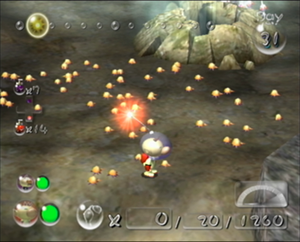Ujadani
| |||
|---|---|---|---|

| |||
| A swarm of the creatures. | |||
| Appears in | Pikmin 2 | ||
| Scientific name | Unknown | ||
| Family | Unknown | ||
| Areas | Wistful Wild | ||
| Caves | None | ||
| Challenge Mode stages | None | ||
| 2-Player Battle stages | None | ||
| Attacks | Poisons Pikmin | ||
Ujadani appear in the Wistful Wild in Pikmin 2 every 30 days, starting at day 31. The name comes from their e-Reader card, and is a combination of the Japanese words うじゃうじゃ (ujauja, "in swarms") and ダニ (dani, "ticks"). They are very small, orange bugs with a 5mm body length that scuttle about in swarms of many and are not documented in the Piklopedia as other enemies in the game are. Upon closer examination, they appear to have tiny scuttling feet before their bulbous backs. Two swarms of 70 can be found on the days they appear. One of the swarms is located near the entrance of the Hole of Heroes, and the other is in the black stone area to the right of the black gate leading to the Dream Den, on the edge of the clearing of Creeping Chrysanthemums. Since they appear so rarely, some players go through the game without knowing of their existence.
The creatures can be attacked – this is similar to the way Pikmin attack rubble and nectar weed – and doing so releases vast quantities of nectar and spray drops. This makes the secret bugs the best source of sprays and nectar in the game. Non-White Pikmin are affected by the poison the swarms release when attacked, which acts like any other instance of poison in Pikmin 2. The insects rarely attack, however, so it's possible to beat all insects without any non-white Pikmin being poisoned.
According to game files, Ujadani are technically obstacles that regenerate on day 1 of every 30 day period. Contrary to popular belief, they do not stop appearing after day 301. This myth must've stemmed from the rumors that were discussed after the game was released, which stated that the save files would be deleted after day 300. They are present on day 1 of the game, though this cannot be observed without hacking.
Spray strategy
Because of the massive amount of sprays the group can drop, these bugs are a great opportunity to increase the spray count. Some further strategies may be employed in order to maximize the profit.
There is a maximum number of sprays and nectar that will come out of the insects (roughly no more than 20 blobs in total are allowed on screen); as soon as the Pikmin start popping them and nothing comes out, they should be stopped and everything on the screen should be absorbed; only then should the attack continue. Doing this will produce considerably more sprays: it is possible to obtain approximately 20 of each this way. The nearby Blowhogs, Swooping Snitchbug, and Chrysanthemums can be used to deflower Pikmin, which in turn can be used to suck up excess nectar, seeing as the limit is on the number of drops and not the number of concentrated doses of spray that exist in the level. This allows for more sprays in total, as the nectars can easily reach the limit of 20 blobs themselves.
So many spray drops in one place present the perfect chance to use a glitch which effectively doubles the number of sprays the player can absorb. Though it may take a little extra time depending on the exact method used, it is well worth the effort to squeeze as much profit out of this rare opportunity as possible.
Entering and exiting a cave will make the bugs respawn, meaning the player can obtain their spoils more than once per day. In combination with the previous strategies, a player can reach over 50 sprays in a single day, from Ujadani alone.
e-card
The e-card has the following text:
ウジャダニ
どこにでもいるダニの仲間で、これと言った特徴
もない。しかし、生態系の大部分はこのように地
味な生き物で成り立っており、「派手」で「特異」
な生物が生態系のほんの一部にすぎないのはどの
星でも同じ事だ。
Which roughly translates to:
Ujadani
A group of ticks that can be found everywhere, it has no notable characteristics. However, the ecosystem is mostly composed of this sort of simple organism, and that showy, unique animals are no more than one part of the ecosystem is true of any planet.
Technical information
- Internal name:
ujamushi
Gallery
The Ujadani next to the Hole of Heroes.
The Ujadani near the gate leading to the Dream Den.
The Ujadani poisoning a Yellow Pikmin.





